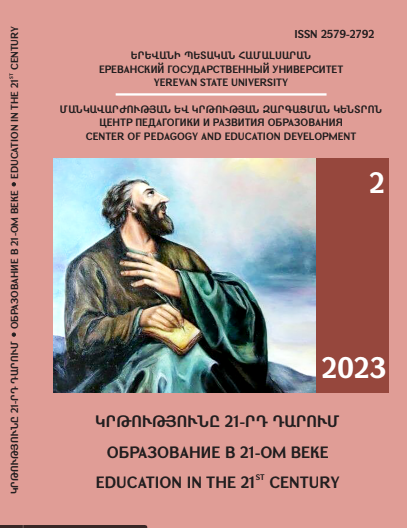ON ISSUES OF PARENT AND CHILDREN INTERACTION
DOI:
https://doi.org/10.46991/ai.2023.2.97Keywords:
interaction, parenting style, interpersonal relationship, interaction component, interaction criterion, interactional role, moral principle, hereditary featureAbstract
Modern life is characterized by deep changes taking place in society, where many processes are born. These processes are characterized by negative phenomena that harm the normal development of the child in the family, the parent-child relationship is broken. This, in turn, changes the moral values, worldviews of different social groups of the society, the way of life of people is expressed in new ways. In this context, the role of school in the establishment and development of families, especially in the relationship between parents and children, has increased in recent decades.
History has shown that it is not always the family that takes over the upbringing of children. This is due to the low socio-cultural level of the family. The inferiority of the psychological and pedagogical potential is equivalent to this. As a result, it is documented that we are dealing with unsuccessful interaction between family and school, parents and children.
A considerable number of pedagogues-scientists dealt with the issues of family and children's interaction in pedagogy. In the article, we often referred to the ideas they tested. Attention was paid to the separated components in the structure of parent-child interaction. The main features of parenting were interpreted. Special attention was paid to the standards of interaction between parents and children: personal, clinical-psychological, contact characteristics of parents and children, adult family members, family traditions and socio-cultural.
Ways and opportunities to optimize the interaction between parents and children with the help of the school were identified and identified. The article describes six criteria of the effectiveness of the interaction between parents and children.
The work also includes parenting styles, which are considered an important component in the system of interaction between parents and children. As a result, an opportunity was created to separate the modern problems of interaction between parents and children in the family.
References
Արզումանյան Ս. Ջ., Անձնավորության սոցիալական վարքագիծը և նրա կազմակերպ-ման հնարավորությունների ուսումնասիրումը, Երևան, 1991, 86 էջ:
Գրիգորյան Վ. Վ., Մանկավարժական կոլեկտիվի և համայնքի համագործակցության կազմակերպման ձևերը դպրոցում: Ատենախոսություն – ԺԳ 0001, մանկավարժության տեսու-թյուն և պատմություն մասնագիտություն, մ.գ.թ. գիտական աստիճանի հայցման, Երևան, 2012, 159 էջ:
Գրիգորյան Վ.Վ. Ծնողների և երեխաների փոխգործակցությունը որպես հոգեբանաման-կավարժական հիմնախնդիր, «Մխիթար Գոշ» գիտամեթոդական հանդես, հ. 1, Երևան, 2005, էջ 103-106:
Գրիգորյան Վ.Վ., Ժամանակակից ընտանիքի սոցիալ-մանկավարժական ներուժը, «Կանթեղ», «Ասողիկ» հրատ., N2, Երևան, 2005, էջ 238-242:
Գրիգորյան Վ. Վ., Ծնող և երեխա. Մանկավարժական ներգործության հիմնական ուղ-ղությունները, «Հայոց լեզու և գրականություն» ամսագիր, N1-2 Երևան, 2005, էջ 121-125:
Абульханов-Славская К.А., Деятельность и психология личности. М., 1980, 335 с.
Варга Л.Я., Дела семейные. – М., 1982, 157 с.
Макаренко А.С., Лекции о воспитании детей. – Москва, 1953, с. 91.
Обозов Н.Н., Межличностные отношения. Привлекательность человека для человека. –М., 1979, 151 с.
Петровский А.В., Дети и тактика семейного воспитания. – М., 1981, 96 с.
Jonson N.F. The Multiplicities of Internet Addiction. The Misrecognition of Leisure and Learning. England, 2008, 166 p.
Downloads
Published
How to Cite
Issue
Section
License
Copyright (c) 2023 Vahagn Grigoryan

This work is licensed under a Creative Commons Attribution-NonCommercial 4.0 International License.

